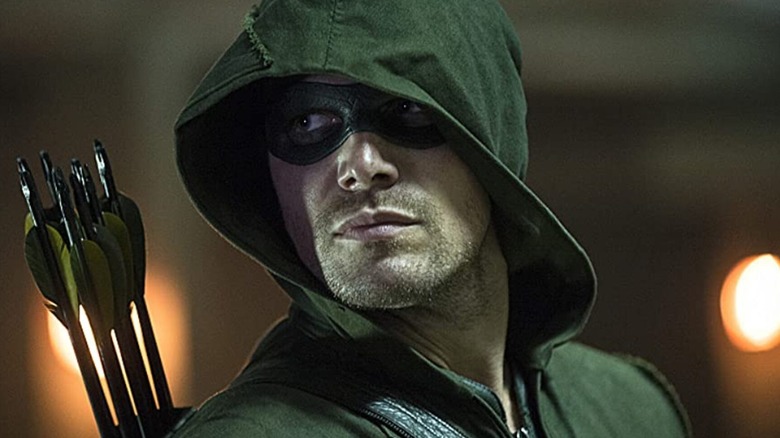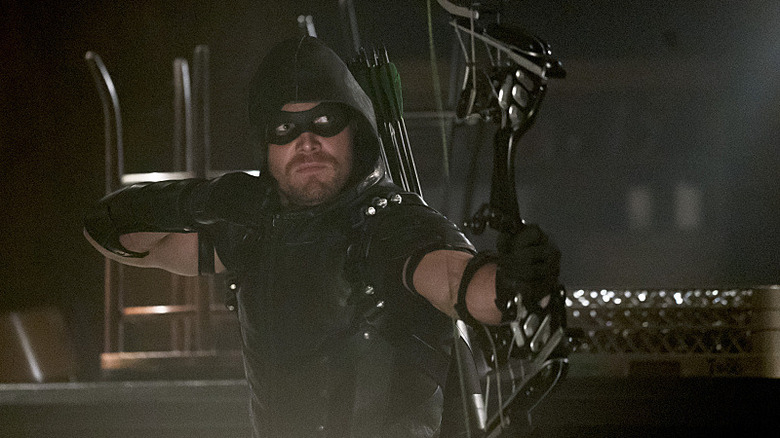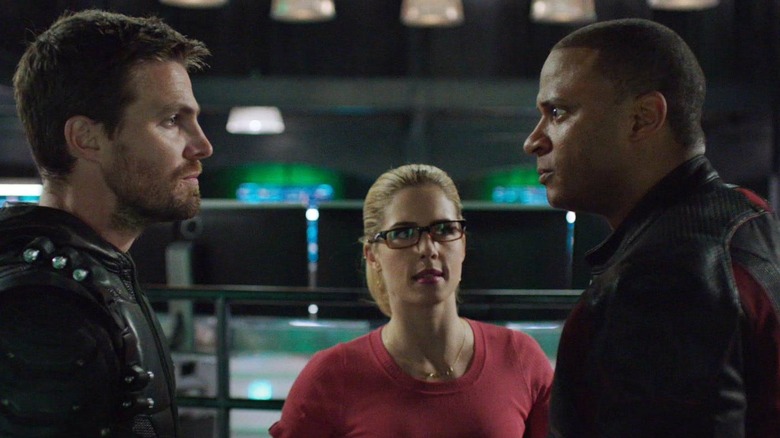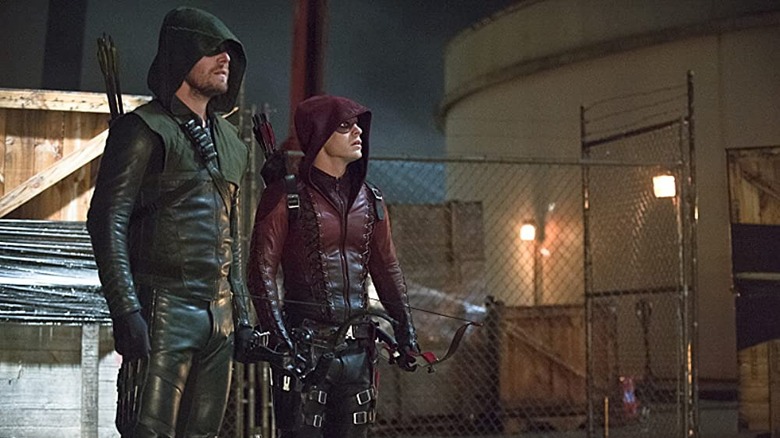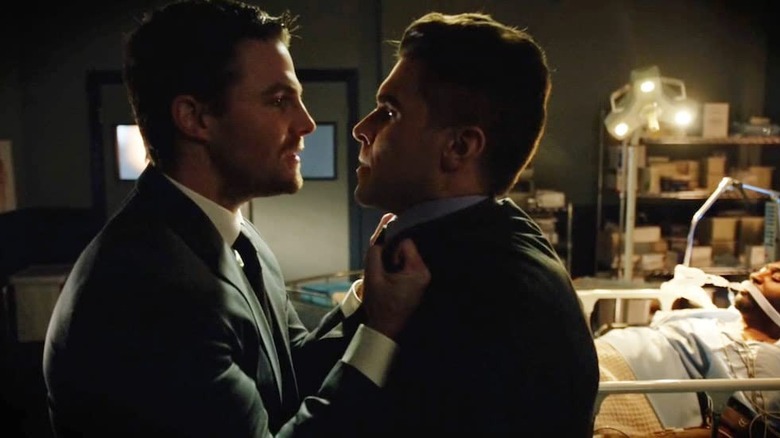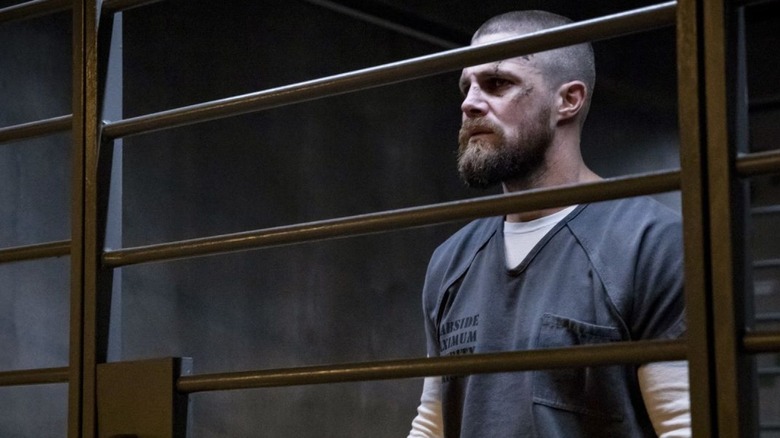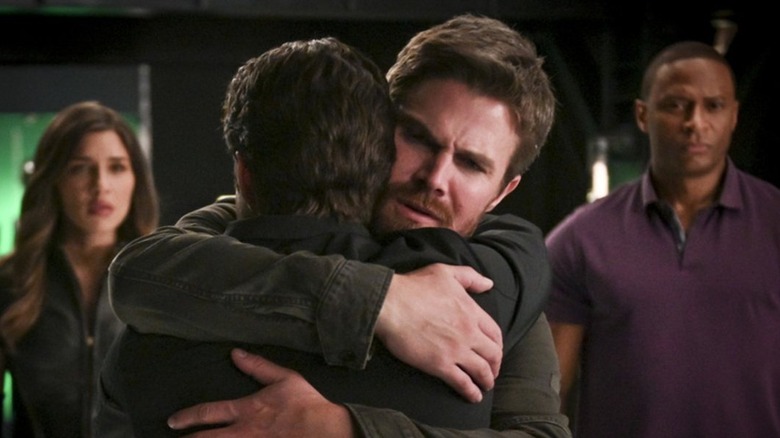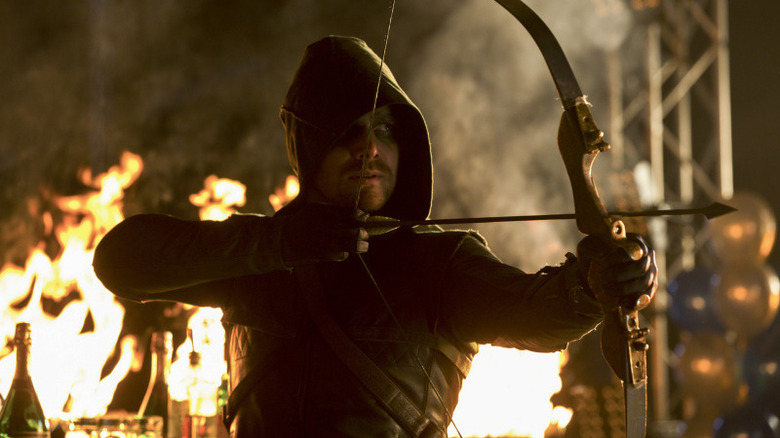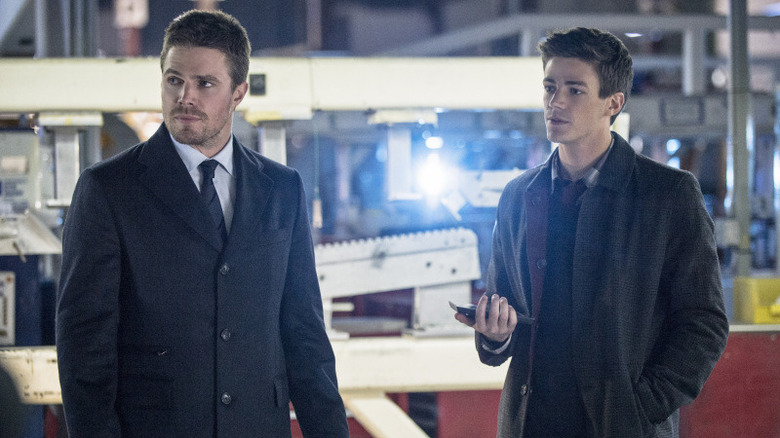Every Season Of Arrow, Ranked Worst To Best
I don't think there has been a superhero television series with an as expansive legacy as "Arrow." Premiering on The CW in 2012, the series not only ran for impressive eight seasons but spawned the "Arrowverse," a shared television universe. "Arrow" led to the creation of "The Flash," "Legends of Tomorrow," and more, with these DC Comics-inspired series regularly crossing over with one another. The show stars Stephen Amell as Oliver Queen, a playboy who returns to his hometown of Star City after presumingly being stranded on a remote island for five years, as the vigilante Green Arrow.
Initially coming out the gate as a dark and gritty take on the Green Arrow mythos, "Arrow" let itself get weird and leaned into its comic book origins for an entertaining, if uneven, superhero show. There is a wide range of quality across the show's entire run, from its attempts to visibly course-correct between seasons to its varying villain-of-the-week format. Here's how all eight seasons of "Arrow" stack up, from the weakest to the inaugural Arrowverse series at its finest.
8. Season 4
Following the events of season 3, "Arrow" was at its tonally darkest. Oliver had to make increasingly morally compromising decisions while his allies were killed or corrupted. Recognizing this, season 4 moved into a significantly lighter direction, with Oliver deciding to use his vigilante persona as a symbol of hope, rebranding himself as Green Arrow. However, this change in tone felt uneven — especially when shocking twists like an attempt to kill Felicity Smoak (Emily Bett Rickards) and the death of Laurel Lance (Katie Cassidy).
However, there are bright spots throughout season 4. Notably, the introduction of Neal McDonough as the season's primary antagonist Damien Darhk, with McDonough reprising his role in other Arrowverse shows. However, the imbalanced tone and the series doubling down on its exploration of the supernatural detracts from the street-level grit that made "Arrow" a fan-favorite show. While "Arrow" season 4 is a vital building block in the Arrowverse, it comes at the expense of "Arrow" as a show. By its season 4 finale, it stumbles into a lackluster ending — making it our lowest entry here.
7. Season 6
By season 6, "Arrow" had turned into a full-on superhero ensemble series, with Oliver leading a team to defend Star City, including John Diggle (David Ramsey), Mister Terrific (Echo Kellum), Wild Dog (Rene Ramirez), and a new Black Canary in Dinah Drake (Juliana Harkavy). As tension between Oliver and his recruits came to a head, the team fractured into two factions: The newer heroes formed a splinter group while Ollie continued to do things his way. Things became more complicated when Oliver's superhero secret leaked to the public while a new criminal mastermind, Ricardo Diaz (Kirk Acevedo), sought to destroy Ollie's life.
Season 6 makes decisive narrative choices in its early episodes only to override them later, which weakens its overall potential. Ollie passes the Green Arrow mantle to Diggle in a brief attempt to retire. When Ollie inevitably reclaims his superhero persona, the fissure between him and the team feels like contrived drama as the show struggles to find new directions for its cast. Coupled with a relatively tepid antagonist in Diaz, "Arrow" feels like it's existed beyond its shelf life.
6. Season 3
"Arrow" has always been darker than most Arrowverse counterparts, except for "Batwoman. But season 3 took this tonal direction a bit too far. From Sara Lance's (Caity Lotz) murder to Oliver's younger sister Thea (Willa Holland) nearly being killed by Ra's al Ghul (Matt Nable), season 3 features a grim narrative. Ra is one of the more lukewarm antagonists in the series, never feeling like a fit to oppose Team Arrow rather than his usual DC nemesis, Batman.
However, the biggest offender in season 3 is the show's insistence use of flashbacks to explain Ollie's five years separated from his home and family. Season 3 posits that Ollie left the island of Lian Yu, where he crashed, ultimately deciding to return to the island instead of home. Not only is Ollie's sojourn off Lian Yu an especially nonsensical leap in logic, but the flashbacks have also overstayed their welcome as an unnecessary and formulaic storytelling component.
5. Season 5
Though Oliver had helped Thea, Diggle, the Lance sisters, and Roy Harper (Colton Haynes) with their burgeoning superhero careers, he became a full-time mentor by season 5. Taking Wild Dog, Ragman (Joe Dinicol), Mister Terrific, and Black Canary under his wing, Ollie's mission officially got an army. Though the divisive move would define "Arrow" for the remainder of its run, the season did bring in one of the show's best villains, Prometheus (portrayed by Josh Segarra, voiced by Michael Dorn).
Segarra's Adrian Chase was Star City's District Attorney, an alter ego of the comic book hero Vigilante. However, this proved to be a grand fakeout: Chase is a supervillain swearing revenge on Green Arrow for killing his father in season 1, leading to Prometheus' creation. Though Team Arrow would triumph in the end, Prometheus knew precisely how to get under Ollie's skin, with their feud pushing Green Arrow to his breaking point and nearly destroying him for good — making for more compelling episodes than previous seasons on this list.
4. Season 7
"Arrow" season 6 ended with Oliver publicly confessing to being Green Arrow, resulting in his conviction and incarceration for crimes committed under his vigilante persona, including murder. Season 7 took advantage of this cliffhanger ending, hitting the ground running with a multi-episode arc that saw Ollie in a maximum security prison surrounded by familiar villains ready for revenge. This extended opening storyline to the season was just the kick in the pants "Arrow" desperately needed, raising the bar of quality through to its eventual end.
Season 7 also saw the show's overarching narrative begin to play with the timeline in its storyline again. But instead of relying on flashbacks as season 3 did, the show utilized flash-forwards instead. Offering a glimpse at Star City in 2040, the flash-forwards followed Oliver's adult children: William (Ben Lewis) and Mia (Katherine McNamara), defending their home from rising crime. The flash-forwards became an innovative way to bring back the longtime storytelling trope with a futuristic twist while the present-day storyline put Team Arrow through the wringer.
3. Season 8
The eighth and final season of "Arrow" had the unenviable task of resolving the series and setting up Arrowverse's "Crisis on Infinite Earths" crossover event, all with a truncated episode order. Still, the show managed to give itself an emotionally satisfying send-off, bringing back familiar faces from across the series' run as Oliver toured the multiverse before making one last stand to save reality. Along the way, the future and present-day timelines converged. Ollie had the chance to see his grown children before making the ultimate sacrifice.
"Arrow" season 8 isn't perfect. A failed backdoor pilot for the proposed spinoff "Green Arrow and the Canaries" served as its penultimate episode, throwing off the season's pacing. However, the inaugural Arrowverse series ended on a poignant series finale, providing Ollie and Felicity with a bittersweet yet happy ending for the pair. The end of "Arrow" marked the end of an era for the Arrowverse, with the rest of the shared universe gradually following in its footsteps with the remaining shows' respective conclusions.
2. Season 1
When "Arrow" premiered, it felt like Christopher Nolan's "Dark Knight" trilogy was the prevailing approach to Warner Bros.' DC Comics adaptations: Everything had a darker and gritty tone. This feeling permeated throughout "Arrow," which reimagined Green Arrow as a lethal crimefighter who killed criminals willy-nilly in the opening season — gruff Batman-like voice and all. One thing lost on more casual viewers is that when Ollie returns to Star City – at the time rebranded Starling City because I suppose it sounded less comic-booky – he returns with a hit list.
Still, while "Arrow" may come off as trying too hard to be edgy in its opening season, it's not as dark as the show got, and there are plenty of solid episodes and scenes here. Malcolm Merlyn's taunt to Ollie that he had failed his city echoed across the Arrowverse to the point of self-parody, but it's effective here. It's wild revisiting Season 1 after seeing how much the show evolved. But the series does have a solid foundation that gets better as the seasons progress.
1. Season 2
"Arrow" has always had a tricky balance in tone and its tenuous place in the Arrowverse. Go too dark, and it doesn't fit in with its counterparts. Go too light, and the show loses what made it great. The season that manages this balancing act the best is in season 2, not coincidentally the last season to air before Arrowverse spinoffs — though those were visibly on the horizon. Still firing creatively on all cylinders from its first season finale, season 2 comes in much more confidently and maintains that steady quality throughout.
The biggest thing going for season 2 is the rise of Deathstroke (Manu Bennett), who had been teased in flashbacks all through season 1 before coming full force in the present. In retrospect, "Arrow" should've ditched flashbacks after season 2, with the showdown between Oliver and Slade Wilson becoming the logical culmination of that story arc. "Arrow" worked better in its corner of the universe rather than being tied into regular crossovers and the introduction of supernatural and sci-fi elements, and season 2 marks that beautiful last gasp.
